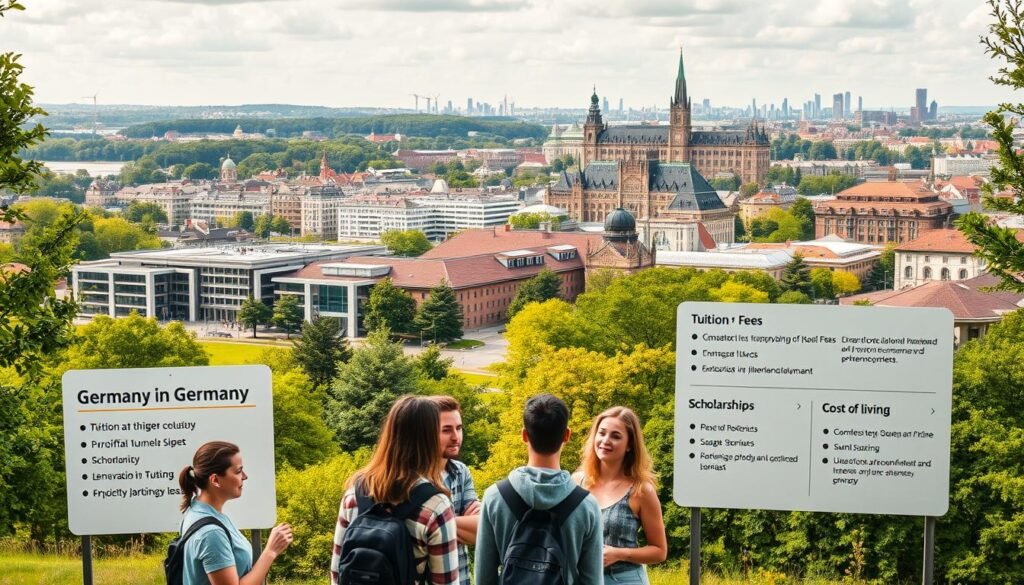Why do thousands of students choose Germany for higher education? The answer lies in its world-class universities, tuition-free programs, and unmatched career opportunities. With over 21,000 courses across 420+ institutions, this country welcomes ambitious learners from around the globe.
Public institutions here charge no tuition fees, even for international students. This makes earning a globally recognized degree more affordable. Plus, graduates can stay for 18 months to find work, boosting their career prospects.
Fields like engineering, business, and STEM attract the most learners. Top-ranked schools, such as TU Munich and Heidelberg University, offer cutting-edge research facilities. Germany’s diverse education system ensures every student finds their perfect fit.
Key Takeaways
- Germany hosts 17% international students, making it a top study destination.
- Public universities offer tuition-free education for all nationalities.
- Students can stay for 18 months post-graduation to seek employment.
- Over 21,000 programs are available across 420+ institutions.
- Popular fields include engineering, business, and STEM disciplines.
Why Study in Germany?
Germany stands out as a top destination for learners seeking affordable excellence. Over 400 public institutions offer tuition-free education, with semester fees as low as €300–400. This includes a transport pass, making daily commutes budget-friendly.

World-Class Education at Minimal Cost
Unlike the UK or USA, where annual fees exceed €20,000, most German schools charge no tuition. Exceptions include Baden-Württemberg, where non-EU learners pay €1,500 per semester. Even then, costs remain far below global averages.
Living expenses vary by city. Munich, for example, averages €1,000 monthly. Smaller towns cut costs by 30–40%. Public healthcare and efficient transit further reduce financial stress.
Career Pathways and Life Quality
Graduates receive an 18-month job seeker visa, a rare perk among study destinations. Strong industries like engineering and tech hire 80% of international alumni within a year.
German cities rank high for safety and infrastructure. Trains connect major hubs in hours, and healthcare covers all residents. Its central European location also simplifies travel to neighboring countries.
A Global Learning Community
With 17% of learners from abroad, campuses thrive on diversity. English-taught programs ease integration, while local culture enriches social life. Scholarships, like DAAD, support top talent financially.
Top Universities in Germany for International Students
Renowned for academic excellence, German institutions attract talent worldwide. Over 420 schools offer diverse programmes, from engineering to social sciences. Public universities dominate the landscape, with most charging minimal fees for all nationalities.
Public Universities with Tuition-Free Programmes
Schools like Universität Hamburg and LMU Munich welcome 300,000+ students annually. These public universities focus on research-driven education, with semester fees under €500. The University of Cologne, for example, offers 200+ degree courses without tuition costs.
Leading Technical and Research Institutions
Eight German technische universität campuses rank in the QS Top 200 for engineering. RWTH Aachen and TU Munich lead with industry partnerships and €12,000 annual fees for non-EU learners. Their labs and alumni networks fuel global innovation.
Specialized Universities of Applied Sciences
FH Aachen and Frankfurt School of business school excel in practical training. Over 90% of graduates secure jobs within a year. Dual programmes blend classroom theory with paid internships, bridging education and employment.
Popular Courses and Study Programs
With over 2,000 English-taught options, learners find diverse academic paths. Public institutions and applied sciences schools cater to global demand, blending theory with hands-on training. Fields like robotics and renewable energy dominate modern curricula.

Bachelor’s and Master’s Degrees in English
English-taught master degrees surged 300% since 2015, per DAAD. Schools like RWTH Aachen offer robotics programmes, while Mannheim ranks top for business. No German? No problem—650+ engineering courses use English.
STEM Fields and Engineering Programs
STEM fields attract 40% of international learners. TU Berlin leads in renewable energy research, and Saarland University pioneers AI. Dual degrees via Erasmus+ add global credentials.
Business, Arts, and Social Sciences
Mannheim Business School rivals global elites. Arts programmes thrive at Berlin University of the Arts. Social sciences blend policy and applied sciences, like FH Dortmund’s urban planning.
Tip: Competitive courses (e.g., FH Ingolstadt’s automotive engineering) require early applications. Check each programme’s deadlines and prerequisites.
Cost of Studying and Living in Germany
Understanding expenses is crucial for anyone planning academic pursuits abroad. Germany offers unique cost advantages, but smart budgeting remains essential. This breakdown covers everything from tuition fees to daily meals.
Tuition Fees: Free vs. Paid Programs
Most public universities charge €0 for education, even for international learners. This applies to 95% of undergraduate programmes across 16 federal states. Exceptions exist in Baden-Württemberg (€1,500/semester for non-EU students).
Private institutions like EU Business School charge €20,000+ per year. These often specialize in business or niche fields. Always verify tuition fees directly with your chosen program.

Semester Fees and Administrative Costs
All students pay semester contributions (€150-350). This covers:
- Public transport passes (€49/month value)
- Student union memberships
- Administrative fees
Some programmes add lab or material fees. Engineering courses may require €500/semester for equipment access.
Monthly Living Expenses for Students
Rent varies sharply between cities. Berlin rooms cost €450-700, while Munich demands €800-1,200. The student visa requires proof of €11,208 yearly funds in a blocked account.
Other monthly costs include:
- Health insurance: €100
- Groceries: €200
- Leisure: €150
Use information from student unions to find budget meals (€3-5 at campus Mensas). The Deutschland-Ticket provides unlimited transport for €49/month.
Scholarships and Financial Aid for International Students
Financial support makes academic dreams achievable for global learners. Over 100,000 scholarships are awarded yearly, easing costs for tuition and living expenses. Options range from government grants to corporate sponsorships.
DAAD Scholarships and Government Funding
The German Academic Exchange Service (DAAD) is the largest provider, funding students across all disciplines. Their opportunities include monthly stipends (€850–1,200) and travel allowances.
Key DAAD programs:
- Application tip: Submit essays 3 months early—competition is fierce.
- Deutschlandstipendium: €300/month for high achievers.
- Research Grants: Covers PhD lab fees and conferences.

University-Specific Scholarships
Top institutions like Heidelberg University offer merit-based awards. Examples:
- MIPLC Scholarships: Full tuition for law students.
- TU Dresden: Fee exemptions for STEM candidates.
Private and Corporate Sponsorships
Companies like BMW fund engineering students with €10,000 annual grants. SBW Berlin supports learners from developing nations, covering housing and education.
Pro tip: Combine multiple awards—StipendiumPlus allows stacking funds.
Conclusion
Pursuing higher education here combines affordability with global recognition. Public universities offer low-cost or free programmes, while post-grad work opportunities boost career growth. Cultural diversity and cutting-edge research further enhance the experience.
Before applying, ensure you have:
- A blocked account with €11,208
- Valid health insurance coverage
- Visa processed 3+ months in advance
Use Uni-Assist for applications and check if your country requires an APS certificate. Explore DAAD’s scholarship database or connect with local Goethe-Institut offices for guidance.
Start preparations early—ideal timelines begin 12 months before enrollment. With the right planning, your academic journey in this vibrant world of learning awaits.
FAQ
Are German universities free for international students?
Most public universities offer tuition-free education, even for non-EU students. However, some states charge nominal fees, and private institutions have higher costs.
What are the best universities in Germany for technical degrees?
Institutions like Technische Universität München and RWTH Aachen rank among the top for engineering and technology programs.
Can I study in Germany without knowing German?
Yes! Many universities offer English-taught programs, especially at the master’s level. However, learning basic German helps with daily life and job opportunities.
How much does it cost to live as a student in Germany?
Monthly expenses average €850–€1,200, covering rent, food, transport, and health insurance. Costs vary by city, with Munich and Frankfurt being pricier.
What scholarships are available for international students?
Options include DAAD scholarships, university-specific grants, and private funding like the Heinrich Böll Foundation awards.
Do I need a visa to study in Germany?
Non-EU students require a student visa, obtained after university admission. EU/EEA students only need a valid passport or ID card.
Are there work opportunities for students in Germany?
Yes! International students can work part-time (120 full or 240 half days per year) and may stay up to 18 months post-graduation to seek employment.






